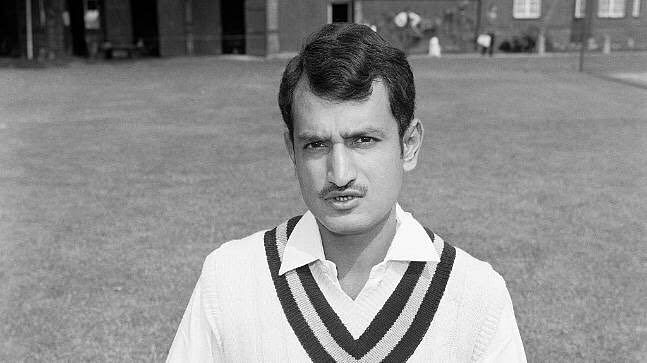No one can take away the credit Wadekar deserves for the feats the Indian team achieved when he was at the helm.
The flamboyant Ajit Wadekar in the 1960s, fielding with his collar up or stroking the ball with all the grace and elegance of a left-hander, is an image whose imprint resurfaced in my mind the moment the news flashed that he is no more.
The death of a person one has deeply admired and followed through childhood can rekindle memories of a past lying dormant in the recesses of one’s mind.
The image then transformed into words that rang in my mind as crisp as the early morning breeze.
“Ye Nehru ka desh, ye Gandhi ka desh (this is the country of Nehru and Gandhi),” the excited voice of Ravi Chaturvedi, quivering with emotion and laden with teary sentiment, refreshed a significant chapter of India’s cricketing history from the past.
Lakhs of Indians were listening to Chaturvedi’s voice on the radio much before the sun had risen in India. The commentator broke down live on air while describing India’s victory, the first ever, against West Indies in 1971.
Also read: Indian cricket’s descent from checks and balances to cheques and (bank) balances
So significant was that win over the formidable West Indies by a team that had lived in defeat all their lives that the commentator lost his sense of balance and went on to say how the great land of Nehru and Gandhi had now achieved another historic feat, comparable to the feats of its freedom struggle heroes.
Many of us cried while the voice in the background broke down.
This win was achieved by an Indian team whose skipper was Wadekar, appointed during extremely contentious circumstances by the casting vote of the chairman of the selection committee. The casting vote was necessitated as the committee had tied on the choice of whether to retain the Nawab of Pataudi as the Indian captain or not. Chairman Vijay Merchant had sided with Wadekar. The newspapers screamed the next day, “Commoner dethrones the Nawab”.
Wadekar was to achieve greater glory, becoming the first Indian captain to win a Test match in England immediately after that historic win in West Indies. That Oval win in the summer of 1971 was the pinnacle of Wadekar’s career. It was India’s first win in the home of cricket over its erstwhile colonial masters and was akin to snatching the most precious jewel from the English crown.
Wadekar as a batsman did not play an important role in those wins. The batting prowess that he displayed by hitting his only century against New Zealand in 1968 had declined considerably. Again, the historic significance of that knock was that it had helped India win its first overseas Test.
Wadekar did not live in the euphoria of his Test wins for long. The Indian team was a disjointed unit, and Tiger Pataudi’s ouster had split the team down the middle. In 1974, when India toured England again, they were bowled out for 42 runs at Lord’s. The team, plagued with internal rebellion and many unseemly controversies, suffered a humiliating defeat on the field.
Wadekar, the much-feted hero, was now a villain, the target of criticism and public anger that forced him to quit both as the captain and a player. Though he returned for a brief while later, his cricketing journey had reached a dead end.
Also read: We should celebrate cricket more. It reduces caste divisions, finds study by MIT
He returned as a manager of the Indian team at the dawn of the nineties and forged an impregnable alliance with captain Mohammad Azharuddin that saw India becoming an invincible force to beat at home. Relying extensively on spin-friendly wickets, Wadekar navigated a rookie captain Azharuddin to unprecedented success, although victories abroad became an elusive dream once again.
He was a soft-spoken man, who loved his spirited evenings no matter what the match situation or the circumstances were, and rarely lost his cool or sense of perspective. As a batsman, he did not fulfil the promise he showed as a cricketer who wanted to break away from the conservative school of Mumbai cricket. It is as the captain of the Indian team that his legacy will endure. No one can take away the credit he deserves for the feats the Indian team achieved when he was at the helm.
Indian cricketing history will always remember Wadekar as the man whose team, for the first time, tamed the British lion in its own den.
Pradeep Magazine is senior sports journalist and columnist.



